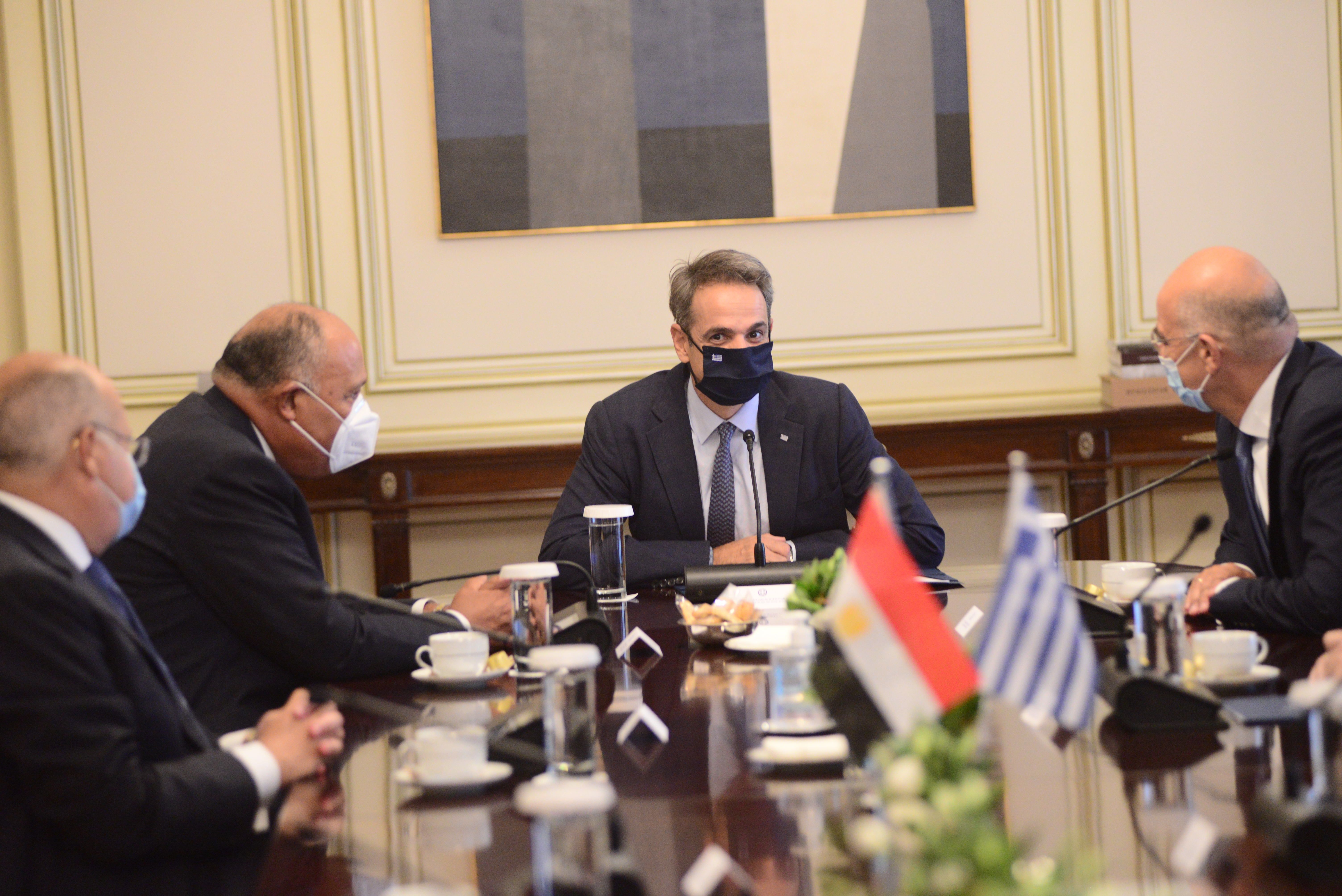Egyptian-Greek Agreement on Sea Delimitation: Meaning for Egypt’s Regional Policy

The Egyptian-Greek agreement was signed during the escalation of tensions between Greece and Turkey in the Eastern Mediterranean. This followed Turkey’s announcement of an extension of its research mission to search for gas in the disputed waters of the Mediterranean Sea (both Greece and Turkey consider the area part of their continental shelf). The agreement is to facilitate the exploitation of oil and gas resources by Egypt and Greece within the designated zones and encourage foreign companies to invest in their production.
Importance of the Agreement for Egypt
The discovery of gas fields within Egypt’s territorial waters of the Mediterranean Sea (including the largest field in the region, the Zuhr) prompted Egypt to seek to become a regional gas hub. This has meant, for example, opening up the country’s economy to private investment in this industry. A key threat to Egypt’s gains from the expansion of the gas trade is regional instability, exacerbated by disputes over territorial waters between countries in the Eastern Mediterranean. Turkey, which is not a member of the Eastern Mediterranean Gas Forum (EMGF, established in 2018 to strengthen regional gas cooperation;), signed a delimitation agreement in 2019 with the Libyan Government of National Accord, headed by Prime Minister Fayez al-Sarraj (the GNA is recognised by the UN) to secure access to deposits located within the Mediterranean Sea. The agreement was declared illegal under international sea law and condemned by Greece, Egypt, Cyprus, and the EU. The deal between Greece and Egypt was a response to the Turkish-Libyan agreement, especially in light of recent Turkish seismic surveys in the vicinity of the Greek island of Kastelorizo (according to the Turkish-Libyan agreement, it is in the Turkish EEZ).
The Greek-Egyptian delimitation of maritime areas defines the scope of the claims of these two states, which are in competition with the Turkish claims. At the same time, the agreement between Egypt and a member of the EU (following the agreement with Cyprus signed 2003) is intended to strengthen the legitimacy of Egyptian policy in the Mediterranean. Egypt’s foreign minister, Sameh Shoukry, emphasised that the aim of the agreement was to maximise profits from the extraction of raw materials. The agreement also was preceded by closer cooperation between Egypt and Greece in other sectors intended to further strengthen the ties between them. In February, the states announced the development of cooperation in sea tourism and the creation of joint tourism programmes. This industry is one of the most important parts of the economies of the two countries, accounting for 18% of Greek and 12% of Egyptian GDP. Greece also expressed support for the Egyptian peace initiative for Libya announced in June.
Egypt towards Turkey
The Egyptian authorities see Turkey as a threat to their stability because of its support for the Muslim Brotherhood (MB), the Egyptian opposition. Relations between these countries collapsed after the military coup in 2013, which overthrew the first democratically elected president of Egypt, Mohamed Morsi, who came from the MB and was supported by Turkey. Since then, Egypt and Turkey have taken opposite positions in regional disputes and conflicts, for example in Libya and between the so-called “quartet” states and Qatar. Since the foundation of the EMGF, access to Mediterranean resources has become the subject of another conflict. Egypt is using regional cooperation to strengthen its position in the dispute with Turkey, enhancing its relations with states hostile to it. The agreement with Greece also serves this purpose. Although it has more legitimacy than the Turkish-Libyan deal (the latter has not been ratified by the Libyan parliament in Tobruk), none of the agreements is fully compatible with the law of the sea, as it does not include all parties interested in the disputed area (in accordance with the Geneva Convention on the Continental Shelf and the Convention on the Law of the Sea, EEZs should be designated based on consensus). Nevertheless, the Egyptian-Greek agreement was not equally condemned by the international community, in part because of Greece’s membership in the EU.
Strengthening cooperation with regional allies is also intended to limit Turkish influence in Libya. Turkish aid has allowed Sarraj to oust the troops of the Libyan National Army—led by Khalifa Haftar and backed by the UAE, Egypt, Russia, France, and Saudi Arabia—from Tripoli. The Egyptian regime is concerned that strengthening Sarraj, who is linked to the MB, may increase Islamist opposition in Egypt. In June, Egyptian President Abdel Fattah Al-Sisi threatened that further advances by Turkish forces in Libya towards Sirte could result in Egyptian military intervention. To curb Turkey’s support for the GNA, Egypt took steps to strengthen its fleet and, together with the UAE, established a Libyan navy squad to block Turkish ships supplying Sarraj’s forces.
Impact of the Agreement on Regional Gas Cooperation
The deal between Greece and Egypt, in light of their intensifying rivalry with Turkey, may make the EMGF primarily a political tool, which will diminish its importance as a forum for regional energy cooperation. This is evidenced by the willingness of the UAE, which considers Turkey and Islamist parties to be its biggest rivals in the region, to join the forum (although the Emirates are not involved in the gas issues in the Mediterranean Sea). Anwar Gargash, the Emirati foreign minister, supported the agreement between Greece and Egypt, calling it “a victory for international law”. An official request to join the EMGF was also expressed by France, which supports Haftar in Libya, and sending aid to Greece during its dispute with Turkey.
The agreement with Greece will also influence the development of cooperation between Egypt and Cyprus. Egypt’s opposition to Turkey’s actions as expressed in the agreement serves to tighten its relations with Cyprus, as the latter’s EEZ is also the subject of a dispute with Turkey. This is particularly important in view of the plans to build an Egyptian-Cypriot gas pipeline, which may contribute to profits for Egypt from the re-export of Cypriot gas. In August, during a visit of Egyptian Minister of Petroleum and Mineral Resources Tarek al-Molla to Cyprus, discussions were held on the plans to build a gas pipeline and to elevate the EMGF to the level of an international organisation.
Conclusions
Egypt’s primary motivation for the deal with Greece is to develop cooperation in the gas industry with regional partners in order to marginalise Turkey and its claims. This is to help Egypt secure profits from potential resource exploitation and tourism routes that are threatened by Turkish gas-extraction efforts in the sub-region, and to limit Turkey’s influence in North Africa. Egypt also wants to take advantage of Turkey’s deteriorating image in the EU because of its instrumental treatment of migration as a means of pressure on the EU authorities.
The EEZs established in the Greek-Egyptian and Turkish-Libyan agreements overlap, which exacerbates the rivalry between Turkey and the EMGF members. The competition with Turkey may reduce the interest of foreign companies in investments in gas extraction in the EEZs of forum members. The politicisation of the forum may also lead to an internal dispute, as EMGF member the Palestinian Authority considers Turkey its most important ally. Thus, it will have a negative impact on the development of multilateral regional energy cooperation. The rivalry in the Mediterranean is also directly related to the tensions between entities supporting groups associated with the MB (Turkey, Qatar, the GNA in Libya) and regimes that seek to limit their influence (UAE, Egypt).
It is in the EU’s interest to strengthen the technical dimension of the EMGF as a platform for energy cooperation between the countries of the region, as well as to promote Egypt’s safe access to resources and further investments by European companies in extraction. So far, the EU has invested about €1.3 billion in the development of the energy sector in Egypt as part of activities aimed at diversifying gas supply sources and becoming independent of Russia in this respect. Negotiations between Egypt, Greece, Turkey, and Libya to find a compromise regarding their EEZs and interests in the Mediterranean Sea would help limit the escalation of tensions.


